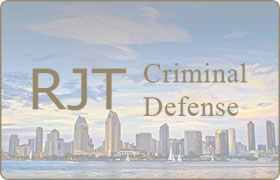La Jolla RICO Act Lawyer, California
Sponsored Law Firm
-
 x
x

Click For More Info:
-
RJT Criminal Defense
2820 CAMINO DEL RIO SOUTH STE 110 SAN DIEGO,CA» view mapDUI Defense, Drug Crimes, Homicide San Diego Criminal Defense Lawyer
San Diego's Experienced,Aggressive Criminal Defense Team is Here. Don’t leave your case, or your future, to chance. Contact us, find out what we can do for you.
800-697-9361 -
- Contact
- Free Evaluation
- Visit:
- Website
- Profile
Not enough matches for La Jolla RICO Act lawyer.
Below are all La Jolla Criminal lawyers.
Terri Shantice Winbush
Employee Rights, Employment, Criminal
Status: In Good Standing Licensed: 20 Years
Alicia Marie Tschirhart
Real Estate, Securities Fraud , White Collar Crime
Status: In Good Standing Licensed: 13 Years
Richard Alan Clegg
Criminal, DUI-DWI, Car Accident, Personal Injury
Status: Inactive Licensed: 34 Years

 Ryan James Tegnelia San Diego,CA
Ryan James Tegnelia San Diego,CA About UsRyan James Tegnelia
About UsRyan James Tegnelia Contact UsContact Us Today!!
Contact UsContact Us Today!!
